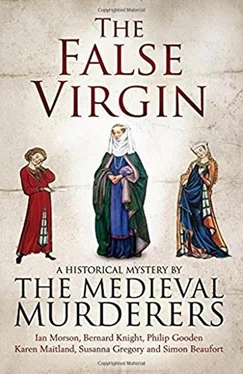There was a babble of concern from his brothers.
‘It is too dangerous, Prior!’’ said his secretary, urgently. ‘Let me go in your place to see if they are amenable to reason.’
‘It will be equally dangerous for you, Mark,’ said Paul gently. ‘But you will come with me – and you both, Louis and Pierre, for you might be able to charm your fellow Frenchmen!’
Amidst a chorus of concern from the other monks, the bar was raised from the gates and the four men stepped out on to the track leading from the priory to the village. As they walked slowly towards the leaders of the army, more men were pouring across the fields, now followed by ponderous supply carts, pulled by both oxen and draught-horses.
When the quartet of monks got within fifty paces of Owain Glyndwr and his lieutenants, the front row of half a dozen riders dismounted, men running from behind them to hold the horses. In the warm summer weather, with their scouts reporting no immediate threat of opposition, most of the knights had discarded their armour, though some still wore a breastplate or a hood of chain mail which covered their necks and shoulders. Owain himself was bare-headed and wore a jupon, a short quilted jacket of green silk. His breeches were thrust into spurred riding boots and a heavy sword hung from a low-slung belt.
As he walked to meet the Benedictines, two of his companions coming close behind for protection, the prior saw a powerful man with abundant grey-brown hair and a forked beard and moustache of the same colour.
They stopped a few paces apart and regarded each other.
‘I am Paul, the prior of St Oswald’s,’ began the monk hesitantly. ‘Do you speak English, sir?’
The impassive face of the Prince of Wales suddenly cracked into a smile. ‘I do indeed – and French, Latin and Welsh! Take your pick, Father.’
Paul felt a sudden wave of relief. Uncertain whether this war-like host had intended to slay him on the spot, he now felt that whatever pillaging of their goods might happen, this civilised man would not unleash an orgy of rapine and murder upon them.
‘What are your intentions here, Sir Owen? We are a small house, with few people and no great riches.’
‘How often have I had that said to me, Prior? But I have no quarrel with the Church – several of my most ardent supporters are of your cloth.’
He swept a hand behind him, where Paul noticed that several of the mounted men wore crosses around their neck
‘What then do you want of us?’ asked Paul.
Glyndwr regarded him coolly. ‘We must be given – or we’ll take – whatever sustenance we can gain here. Your grain, fodder and meat. And a place to rest up for a day, as I have many tired and hungry men here.’
One of the men in French uniform spoke up from behind the leader. His English was heavily accented. ‘Are there no estates or great houses nearby? They are the places where we are more likely to find worthwhile stores to plunder.’
Before Paul could reply, Louis spoke up in his native language, addressing the speaker. ‘None before Malvern or Upton. You need to move on a few more miles.’
Not to be outdone before a fellow-countryman, Pierre also made his nationality known, by using the same tongue. ‘It is a pleasure to hear God’s own language spoken in this outlandish country, Monsieur.’
Glyndwr’s bushy eyebrows rose a little as he turned his head to speak to his Gallic comrade.
‘We seem to have come across a nest of Frenchmen, Comte de Salers!’ He swung back to Pierre and Louis. ‘And what are you doing here, sitting on the Welsh border?’
‘I am the sacristan, recently from the abbey of Fontrevault – and anxious to return there! This is Brother Louis, our infirmarian.’
‘A Doctor of Physic from Montpellier.’ Even in such a fraught situation, Louis could not resist flaunting his badge of fame, and the Welsh leader seemed interested.
‘One reason for our need to halt here for a day or so is that we have sick and wounded men. Will you look at them or have you scruples about helping the enemy?’
This was a challenge to Louis’s Hippocratic oath.
‘They are not my enemies,’ he snapped. ‘All men in distress deserve Christian aid. You seem to have many of my countrymen in your retinue, so I will ask them how we might best aid the sufferers.’
Owain called the Comte de Salers forward and the two French monks went to confer with him, leaving the prior and his secretary facing the prince.
‘If you have many sick men, perhaps they would be better housed in our infirmary and in the guest-house, rather than lie in carts or on the cold grass out there,’ he suggested, pointing to the mass of men who were now covering the field, many sitting or lying down.
Already some were forming into groups and lighting fires with sticks picked up on their journey through the woods.
‘Where are your own villagers now?’ demanded Glyndwr.
‘Inside our walls. The women and children are in the guest-house, but we can move them to the lay brothers’ dormitory if you wish to shelter your sick and wounded.’
Glyndwr regarded the plump prior critically. ‘You are a compassionate man, unlike some clerics we confront! They often abuse us, resist and even try to offer us violence.’
Mark thought it was time he said something to support his prior. ‘We are a house of healing, sir. The priory was founded centuries ago because of the miracle of the spring, above which the church was built. Much of our work is treating the sick, either by the magic of Beornwyn’s fountain or by the expertise of physicians like Brother Louis.’
Glyndwr seized upon the idea of a magical spring. His fascination with divination and mystic signs made anything occult a welcome diversion from the years of warfare to which he had committed himself.
‘We have a strong tradition of healing wells in Wales. Tell me of this spring you have here.’
Between them, Mark and the prior outlined the history of Beornwyn and St Oswald.
‘Some two hundred years ago, we were given some of the bodily relics of that saintly virgin to keep in the church,’ added Paul. ‘Since then, the power of healing has increased, as has the reputation of the priory to attract pilgrims.’
The Welsh prince was no fool and knew that this meant that donations must have filled the coffers many times over since the spring and the relics attracted a stream of supplicants. But he was interested in the more mystical aspects of the story.
‘I must see this famous fountain for myself – and touch your virgin’s relics,’ he announced. ‘They may confer good fortune upon our crusade!’
Paul realised that the gold-banded skull was now hidden away, and they had carefully avoided mentioning it in treating the sick. Thankfully, he thought, they still had several other mouldering bones in the reliquary, which could be shown to Glyndwr to satisfy his curiosity. The more affable they could make their relationship, the better chance the priory had of getting away with a minimum of looting.
‘Come in now, and bring your senior officers with you,’ he invited. He led them back to the priory gates and called to the porters to throw them wide. ‘And leave them open, there will be sick and wounded coming in shortly,’ he commanded.
His two French brothers had gone off with some of Owain’s captains into the now dense crowd of soldiers, to find men in most need of medical care, but Mark kept close to the prior as they led Glyndwr into the outer courtyard. Many of the villagers and lay brothers shrank back as the armed men strode through, but Paul called to the rest of his monks to follow them to the church.
He led the invaders up the steps and across the empty nave until they reached the marble fountain and the effigy of St Beornwyn. As Paul genuflected in deference to the high altar, he was surprised to see that Owain Glyndwr dropped to both knees on the flagstones, crossed himself and held his hands before his bowed head, as he murmured some prayers. Then he climbed to his feet and looked with interest at the unusual fountain that sat before the chancel arch.
Читать дальше












